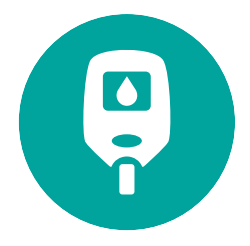Kidney Disease & Your Skin: Rashes, Sores, & Itching

Dry and itchy skin, sometimes referred to as cutaneous manifestations, is common among people living with chronic kidney disease (CKD). These symptoms vary from person to person and can range from irritating to unbearable. Some people may experience itchy skin in one centralized location while others may feel itchy all over their body. Learn about common ways kidney disease can affect your skin as well as tips for keeping your skin healthy.
Why Does Kidney Disease Affect the Skin?
Kidney disease can bring about certain physical changes, including changes to your skin. When living with CKD, your kidneys aren’t able to filter your blood as healthy kidneys would, causing waste and toxins to build up, which can leave your body feeling extremely itchy. The kidneys also have trouble balancing certain minerals including phosphorus. When your phosphorus levels get too high, it can cause your skin to be dry and irritated. In addition, kidney disease can lead to changes in your sweat glands, causing your skin to dry out.
8 Common Ways Kidney Disease Can Affect Your Skin
If you are living with CKD, you may experience one or more of the following changes to your skin.
- Rashes—can develop when your kidneys aren’t able to remove waste from your body. These rashes can present themselves as small, dome-shaped bumps and can be extremely itchy. The bumps can also form together, creating rough, raised patches on your skin.
- Dry skin—may occur causing your skin to feel extremely tight. Your skin may start to crack.
- Itchy skin—also known as pruritus, is a common side effect of kidney disease that can range from irritating to life disrupting.
- Blisters—sometimes people living with kidney disease will develop blisters on their hands, feet, and/or face.
- Calcium deposits—damaged kidneys have trouble maintaining a healthy balance of minerals in your blood. Due to this imbalance, some people may develop calcium deposits under their skin. They typically appear near joints and are not painful unless they form within one of your fingertips.
- Swelling—a healthy kidney removes extra fluids and salt from your body. When your kidneys are damaged, fluids and salt can build up in your body, causing swelling in your legs, ankles, feet, hands, and/or face.
- Changes to skin color—the buildup of toxins in your body, when your kidneys aren’t filtering your blood as they should, can cause color changes to your skin. You may notice a gray or yellow hue to your skin, areas of darkened skin, or an unhealthy pale tone. If you’ve had itchy skin for a long time and scratch often, you may also see yellowish, thick skin with bumps or cysts.
- Discolored nails—kidney disease can affect the look of your fingernails and toenails. You may notice what is called “half-and-half” nails, meaning the top part of your nails is white and the bottom part is a reddish-brown color. You may also see a white band across one or more of your nails.
7 Tips for Keeping Your Skin Healthy
Changes to your skin can be frustrating and, if left untreated, can impact your quality of life. Review the following tips and start incorporating them into your daily routine to help keep your skin healthy.
- Monitor your calcium phosphate intake. It is important to take your phosphate binders as prescribed by your doctor to ensure your calcium phosphate levels stay in check.
- Follow a kidney-friendly diet. What you eat and drink—and how much—can affect your health. In addition to other benefits, eating a kidney-friendly diet can help you feel your best and keep your phosphate levels down, reducing skin irritation.
- Avoid scratching your skin. Scratching may provide short-term relief, but it often makes the itching worse and can damage the skin or cause an infection.
- Steer clear of products with strong perfumes. The perfumes in certain products can cause allergic reactions or skin irritation, so it is best to use unscented products.
- Wear comfortable clothing. Clothing made from cotton or other natural fabrics can be more soothing on your skin. Wearing loose-fitting clothes can also help because they don’t rub against your skin.
- Moisturize. Putting cream on at least once a day can help combat dry skin, relieving some of the itchiness you may be feeling.
- Avoid hot baths. Hot water can leave your skin feeling dry and irritated. It is also recommended to take showers instead of baths.
When to Talk to a Doctor
The above tips can help you keep your skin healthy, however, it is still important to discuss any concerns you may have about your skin with your doctor. If your skin is feeling itchy or irritated all or most of the time, talk to your doctor about possible medications or treatment options. If you wait too long to contact your doctor and seek help, your symptoms may get worse, and it may be difficult to reverse the progression.
In fact, it is never too soon to talk to your doctor. Early detection of kidney disease can help prevent the progression of CKD and associated complications such as rashes, sores, and itchy skin. Discovering kidney disease in the early stages can help you take control of your health sooner and keep your skin healthy. By partnering with your doctor, you can develop a treatment plan to ensure you stay healthy and feel your best.
In fact, it is never too soon to talk to your doctor. Early detection of kidney disease can help prevent the progression of CKD and associated complications such as rashes, sores, and itchy skin. Discovering kidney disease in the early stages can help you take control of your health sooner and keep your skin healthy. By partnering with your doctor, you can develop a treatment plan to ensure you stay healthy and feel your best.
Suggested topics
Managing Anemia and Chronic Kidney Disease: What You Should Know
Did you know that anemia is a common side effect of chronic kidney disease (CKD)? If your kidneys aren’t working the way they should, it could affect your body’s ability to make red blood cells, causing anemia. Managing multiple health conditions...

Managing Blood Sugar and Chronic Kidney Disease
If you are living with diabetes and kidney disease, it is important to stay in control of your blood sugar so you can be your healthiest and avoid other...
Medications to Avoid or Adjust If You Have Chronic Kidney Disease
When your kidneys don’t function the way they should, prescription and over-the-counter medications can build up in your blood and may cause additional damage to your kidneys or other parts of your body...

Stay on top of your kidney health
Learn how to manage your kidney disease and slow progression with tips and resources. Our class will empower you to make the best decisions for you.
Sign up